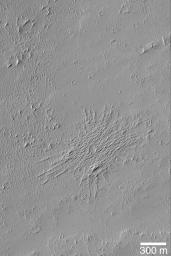
|
Pedestal Crater and Yardangs
- Click the image above for a larger view
- Full-Res JPEG (540 x 810) (88.3 kB)
- Full-Res TIFF (540 x 810) (438.1 kB)
Caption:
MGS MOC Release No. MOC2-444, 6 August 2003
This April 2003 Mars Global Surveyor (MGS) Mars Orbiter Camera (MOC) image shows a small meteor impact crater that has been modified by wind erosion. Two things happened after the crater formed. First, the upper few meters of surface material into which the meteor impacted was later eroded away by wind. The crater ejecta formed a protective armor that kept the material under the ejecta from been blown away. This caused the crater and ejecta to appear as if standing upon a raised platform--a feature that Mars geologists call a pedestal crater. Next, the pedestal crater was buried beneath several meters of new sediment, and then this material was eroded away by wind to form the array of sharp ridges that run across the pedestal crater's surface. These small ridges are known as yardangs . This picture is illuminated by sunlight from the upper left; it is located in west Daedalia Planum near 14.6°S, 131.9°W.
Cataloging Keywords:
| Name | Value | Additional Values |
|---|---|---|
| Target | Mars | |
| System | ||
| Target Type | Planet | |
| Mission | Mars Global Surveyor (MGS) | |
| Instrument Host | Mars Global Surveyor | |
| Host Type | Orbiter | |
| Instrument | Mars Orbiter Camera (MOC) | |
| Detector | ||
| Extra Keywords | Crater, Grayscale, Impact | |
| Acquisition Date | ||
| Release Date | 2003-08-20 | |
| Date in Caption | 2003-08-06 | |
| Image Credit | NASA/JPL/Malin Space Science Systems | |
| Source | photojournal.jpl.nasa.gov/catalog/PIA04678 | |
| Identifier | PIA04678 | |
